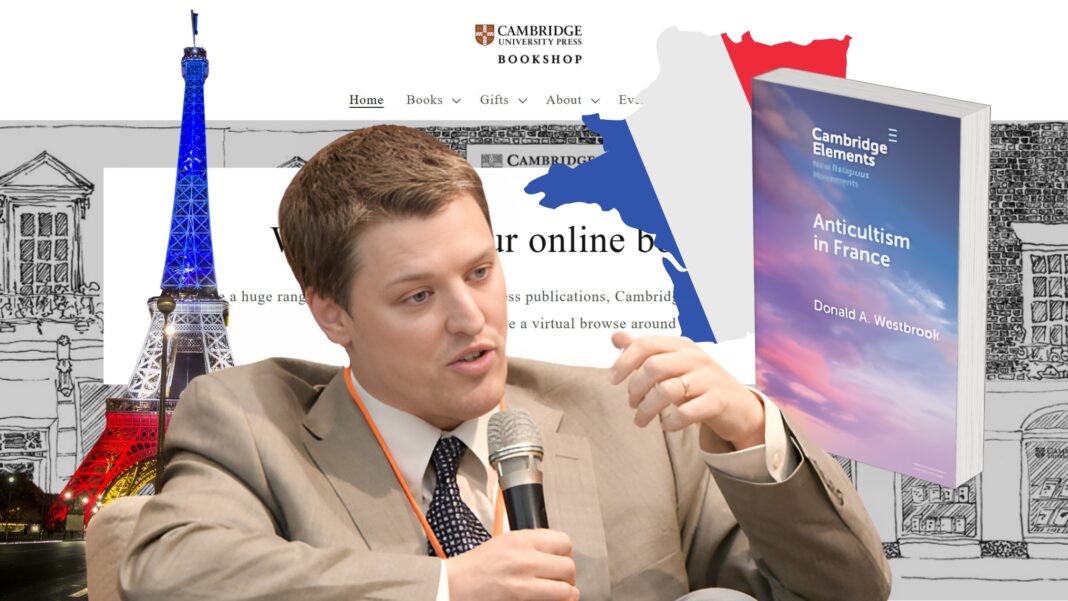In a world that often misunderstands and ostracizes unconventional beliefs, Donald A. Westbrook’s groundbreaking 2024 book, Anticultism in France, emerges as a beacon of scholarship and attention to the details.
Being released by Cambridge University Press (June, 2024), this publication explores the past and present state of new religious movements (NRMs) in France, providing readers with a thorough and captivating account that goes beyond clichés and biases. A part of the “Elements in New Religious Movements” collection, the book is extensively and skillfully crafted, making it ideal, for scholars, decision makers and the wider audience.
Its detailed examination of both the anticult movements in France and the specific case of Scientology serves not only as an academic treatise but also as a captivating story of resilience and human rights.
The Deep Roots of Anticultism in France
Westbrook starts off with an introduction that lays the foundation for delving into the book’s themes. The story quickly guides readers through the events linked to the Solar Temple and the subsequent emergence of MIVILUDES (Interministerial Mission, for Monitoring and Combating Sectarian Deviances) originally the whitewashed MILS, and which is starting to be the subject of scrutiny for financial scandals as reported by Le Monde.
This historical backdrop is crucial for understanding the hostile environment in which NRMs, including Scientology, have had to navigate their existence.
Through a blend of historical analysis and contemporary evaluation, Westbrook makes it clear how deep-seated fears and misconceptions have fueled France’s anticult stance. The book methodically traces these roots, providing readers with a nuanced understanding of why and how certain beliefs come to be viewed with such suspicion and hostility.
Scientology: A Case Study in Persecution and Resilience
In a captivating transition, Westbrook’s second chapter of ‘Anticultism in France‘ zooms in on Scientology. Here, the book shifts from broader historical narratives to a focused examination of one of the NRMs in France that has overcome more barriers but which recently made it to open an over 8000 square meters landmark church steps away from Stade de France, situating it in the heart of the upcoming 2024 Paris Olympics.
Scientology’s journey in France is a saga of legal battles, public denouncements, and extraordinary resilience. Westbrook painstakingly documents these struggles, from court cases to societal backlash, revealing the broader implications for other minority religions. By emphasizing the human element—stories of individual members and their personal trials—the book fosters a deeper empathy and understanding.
This chapter is particularly striking because it challenges readers to reconsider their preconceived notions about Scientology. Whether you view it with skepticism or curiosity, the book’s detailed historical account compels you to acknowledge the challenges faced by its members and to question the fairness of their treatment by the French state and specific elements of its society.
Reflections on the Future
Westbrook’s final chapter, “Reflections on the Future of New and Minority Religions in France,” provides a thoughtful and forward-looking analysis. Here, the book moves from historical recounting to strategic contemplation. What does the future hold for NRMs in a country with such a fraught relationship with religious diversity?
Westbrook isn’t afraid to tackle inquiries, rather he welcomes them, providing thoughtful forecasts and possible solutions. In this section, he urges policymakers, religious figures and the general people to promote a society that’s more accepting and empathetic. The book does not only record instances of persecution, it aims to provoke a daring path for transformation. It encourages readers to analyze the concepts of freedom critically and emphasizes the significance of protecting these liberties for everyone, no matter how unorthodox or unconventional their beliefs may seem.
The Human Impact
Westbrook’s writing in the book Anticultism in France is filled with a sense of respect for the people living their beliefs, even when facing undue consequences. This focus on connection may be considered one of the book’s most significant asset.
By presenting well-researched facts alongside personal stories and reflections, it makes the academic accessible and the complex comprehensible.
Westbrook’s narrative is not just about policies and prejudices; it’s about people—those who have suffered, resisted, and those who continue to believe against all odds. This perspective transforms the book into more than a historical or sociological study; it becomes a deeply human story about the quest for legitimacy and understanding in a world that can be unforgiving of difference.
Academic Rigor and Curiosity
The book is truly an academic accomplishment, showcasing years of dedicated research, thorough analysis and thoughtful writing. Donald Westbrook’s extensive list of references and documented sources give the work credibility and significance. It serves as a testament to the power of rigor paired with genuine curiosity.
For scholars and students alike, the book offers a wealth of knowledge and insights. It lays a groundwork, for further exploration and sparks fresh conversations and discussions. Westbrook’s talent in weaving vast amounts of information into a coherent and captivating story is truly praiseworthy.
Should you read this Book?
In today’s world, where false information and bias often easily and irresponsibly circulates, Westbrook’s book is a must-read for anyone interested in topics like religious freedom, human rights and social justice. It urges us to delve into the complexities of NRMs rather than just skimming the surface. It is written in a way that it is not just for scholars or those directly connected to NRMs, it’s for everyone who values understanding and living together in peace. Readers may feel prompted to step out of their comfort zones and consider the perspectives and rights of marginalized believers.
Donald A. Westbrook’s work “Anticultism in France” tells a story of resilience, challenges and prejudice, while picturing an inclusive future. For those seeking to broaden their knowledge about diversity and its obstacles, this book is an invaluable asset. If you believe, or not, that knowledge can nurture empathy and instigate change, I advise you to read Westbrook’s analysis and recounts, as one may, if that is possible, become more knowledgeable, empathetic and more humane.











